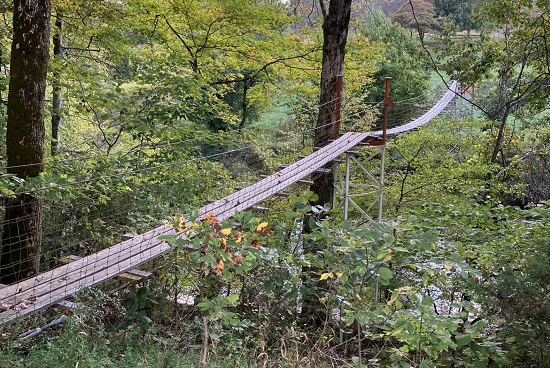Bridge the Gap
On a mission trip several years ago, a subway recording told us to mind the gap. That warning to watch our step prevented accidents. More important than minding the gap, our team wanted to bridge the gap.
To bridge the gap means to serve as a bridge.
We connect two:
- Points
- People
- Groups of people
We bridge the gap when we build physical bridges.
Many of us love old swinging bridges. However, most bridges today are stronger, safer, and not as scary. All bridges make it easier to get from one place to another.
We also build relationship bridges.
Two people or groups of people may disagree or misunderstand one another. To bridge the gap, we unite them. Gaps occur in:
- Beliefs
- Languages
- Goals
To bridge the gap relieves a problem.
If we:
- Need money, we request a loan.
- Feel overwhelmed, we seek support.
- Require help, we ask for assistance.
Jesus bridges the gap between God and people.
That was the message our mission team shared.
Our sins or wrongdoings separate us from the one and only holy God. Jesus came to earth to pay the price for our sins. He:
- Lived a sinless life.
- Died on a cross to pay the price for our sins.
- Rose from the dead on the third day, defeating sin and death.
Jesus solved our sin problem. When we turn from our wrongs and give control of our lives to Jesus, we cross the bridge from death to eternal life.
As we celebrate Christmas, may we never forget the reason Jesus came.
“Very truly I tell you, whoever hears my word and believes him who sent me has eternal life and will not be judged but has crossed over from death to life” (John 5:24).
Thanks to Beckham Wilson for the suggestion.
Do you have an expression you want explained or a thought about this one? If so, please comment below.
Subscribe to receive my weekly posts by email and receive a free copy of “Words of Hope for Days that Hurt.”
If you enjoyed this post, please share it with your friends.

 All my life I have heard people say, “God willing and the creek don’t rise.” My family usually said, “Good Lord willing and the creek don’t rise.”
All my life I have heard people say, “God willing and the creek don’t rise.” My family usually said, “Good Lord willing and the creek don’t rise.” We can’t go back when we burn our bridges behind us.
We can’t go back when we burn our bridges behind us.